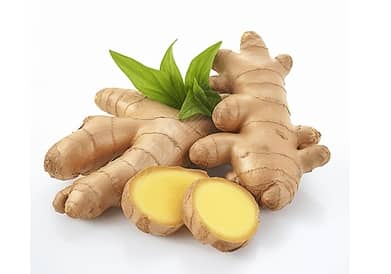It may look ordinary, but in traditional Chinese medicine (TCM), ginger is a powerful herb with a long-standing reputation for promoting health and fighting disease. Want to know how to use it correctly—and when you shouldn’t? Let’s break it down!

Table of Contents
- Origin and Basic Properties of Ginger
- TCM Characteristics and Core Functions
- Common Clinical Applications
- Classical TCM References & Folk Wisdom
- Contraindications and Cautions
- Ginger Skin vs. Ginger Juice: What’s the Difference?
1. Origin and Basic Properties of Ginger
Ginger is the rhizome of the Zingiber officinale plant. It’s a common kitchen spice, but also a widely used herb in TCM.
🔸 Other names: Sheng Jiang (Fresh Ginger), Ginger Root
🔸 Form: Knobby, fibrous rhizome with a spicy, aromatic flavor
🔸 Nutritional content: Rich in volatile oils, gingerol, vitamin C, and trace minerals
In both cooking and medicine, ginger is valued for its warming, stimulating qualities.
2. TCM Characteristics and Core Functions
📌 Nature & Flavor: Warm in nature, pungent in taste
📌 Meridians entered: Lung, Spleen, Stomach
📌 Main Functions in TCM:
✔️ Dispels cold and releases the exterior – Great for early-stage colds
✔️ Warms the stomach and stops vomiting – Excellent for nausea, including morning sickness
✔️ Warms the lungs and relieves cough – Especially good for cold-type coughs
✔️ Detoxifies and neutralizes toxins – Effective against seafood or herbal toxicity
✔️ Invigorates circulation – Helps with cold-induced stagnation and pain
3. Common Clinical Applications
👉 Wind-cold common cold: Pair ginger with scallion stalks for a warming tea
👉 Stomach cold, nausea, or vomiting: Use fresh ginger slices or juice
👉 Cold-type cough with clear phlegm: Ginger tea with brown sugar soothes symptoms
👉 Food poisoning (seafood): Ginger juice helps detoxify
👉 Cold hands and feet: Ginger foot soaks or warm ginger drinks can help improve circulation
4. Classical TCM References & Folk Wisdom
📖 Compendium of Materia Medica (Li Shizhen): “Ginger clears filth and awakens the mind.”
📖 Essential Prescriptions Worth a Thousand Gold (Sun Simiao): “Ginger is the king of exterior-releasing herbs.”
💬 Traditional sayings:
- “Use ginger wisely, and disease stays away.”
- “Morning ginger is better than ginseng soup.”
👉 This reflects ginger’s ability to support yang energy, especially in the morning when yang is rising.
5. Contraindications and Cautions
Even good things have their limits. Ginger should be used with care in the following cases:
🚫 Yin deficiency with internal heat: Symptoms like night sweats, dry mouth, or irritability
🚫 Heat-type infections or sores: Ginger may worsen inflammation
🚫 Pregnant women: Particularly those with heat signs should limit intake
🚫 Nighttime consumption: May disturb yin and affect sleep
🚫 Autumn season: Autumn calls for conservation, while ginger promotes dispersion
📌 Hence the old Chinese warnings:
“No ginger at night, in heat, or in autumn.”
6. Ginger Skin vs. Ginger Juice: What’s the Difference?
🌿 Ginger Skin
- Nature: Cool and pungent
- Function: Promotes urination and reduces swelling
- Use for: Edema, water retention, and difficult urination
🍹 Ginger Juice
- Similar properties to fresh ginger
- Especially effective for:
✔️ Stopping vomiting
✔️ Dissolving phlegm
✔️ Detoxifying seafood and herbal toxins
💡 Tip: Leave the skin on if you want warming effects; peel it for cooling applications.
✅ Final Thoughts
Ginger may be humble in appearance, but it’s a true powerhouse for health. Whether you’re fighting off a cold, warming your stomach, or clearing toxins, this kitchen staple does more than just add flavor—it adds balance.
☀️ Remember:
“Ginger in the morning strengthens yang. Ginger at night may disturb peace.”